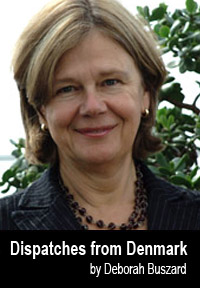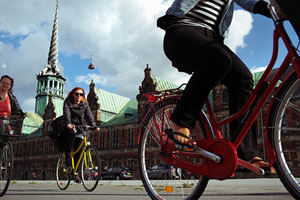 |
December 15
Copenhagen
Eighty city mayors from around the world gathered today at COP 15 to talk about climate change and adaptation. The mayors will be talking about ways to reduce climate impact and become more energy efficient and cost effective in their city activities. According to the International Energy Agency (IEA) cities consume more than 60 per cent of the world‚Äôs energy. A recent IEA report said municipalities have significant opportunities to reduce GHG emissions, but few are yet taking action. As cities grow and populations increase finding new energy efficient ways to provide services to urban populations will become even more critical.¬Ý¬Ý¬Ý
The host of the meeting, Mayor of Copenhagen Ritt Bjerregaard, has an ambitious goal for his city: to become carbon neutral by 2025. It‚Äôs probably feasible: more than a third of the population already gets to work or school by bike, the local metro system is great and Copenhagen has an extensive district heating system, using waste heat from electricity generation and the city aims to replace the coal currently used for power generation with biomass.¬Ý
 |
| A third of the population in Copenhagen commutes by bike. |
Halifax also has climate-related goals; it recently signed on to the World Energy Cities Partnership (WECP) a group of 15 cities with significant energy industries. The group includes Calgary and St. John‚Äôs in Canada, Houston (USA), Perth (Australia), Stavanger (Norway), San Fernando (Trinidad and Tobago), Port Harcourt (Nigeria) and Aberdeen (Scotland).¬ÝWECP members recently signed a Climate Change Accord, agreeing to reduce GHG emissions by a minimum of 20 per cent¬Ýfrom 2005 levels by 2020 and by a further minimum of 80 per cent¬Ý(compared to 2005) by 2050. Sounds good, but compare this target with that set by Copenhagen (which actually reduced its CO2 emissions by 20 per cent from 1995 to 2005) which plans to reduce it by another 20 per cent by 2015, and then to become carbon-neutral (free of fossil fuel) by 2025.
Julian Boyle, energy guru at HRM and with the NS mission to COP 15, has interesting ideas about increasing energy efficiency back home and there‚Äôs a lot we can do.¬Ý But we have a long way to go before we catch up to Copenhagen.
P.S.¬Ý Update from COP 15¬Ý central ‚Äì the negotiations were back on by mid afternoon, but apparently confined to procedural issues.¬ÝIt‚Äôs going to be a challenge to keep up with this part of the story as meetings go on over the next few days.
Deborah Buszard is the Associate Director, Research and Outreach, with ª∆…´÷±≤•'s College of Sustainability.
